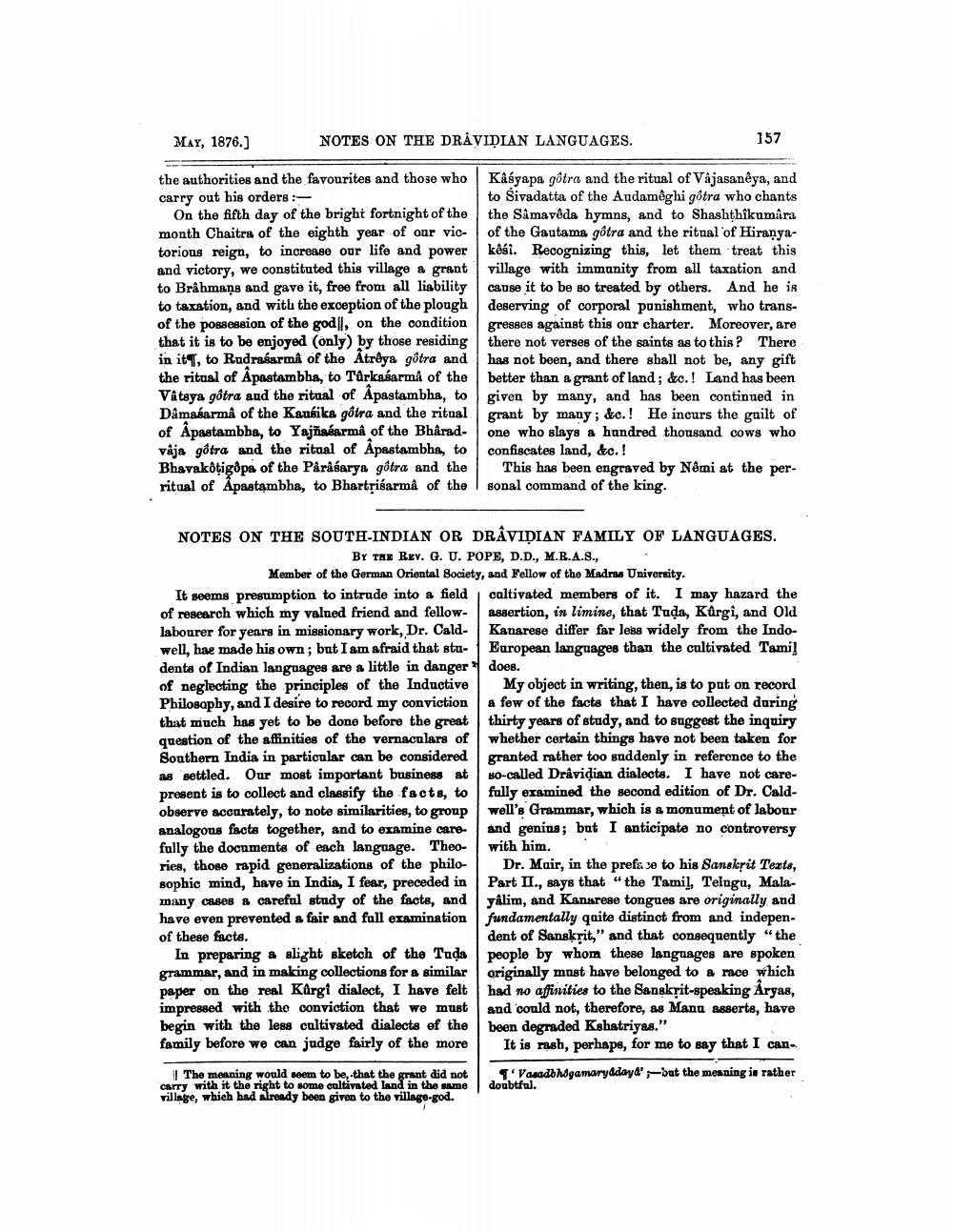________________
MAY, 1876.]
NOTES ON THE DRAVIDIAN LANGUAGES.
157
the authorities and the favourites and those who carry out his orders :
On the fifth day of the bright fortnight of the month Chaitra of the eighth year of our victorious reign, to increase our life and power and victory, we constituted this village a grant to Brahmans and gave it, free from all liability to taxation, and with the exception of the plough of the possession of the god|l, on the condition that it is to be enjoyed (only) by those residing in it, to Rudraśarma of the Atrôya gôtra and the ritual of Apostambha, to Türk sarma of the Våtsya gôtra and the ritual of Apastambha, to Damasarma of the Kausika gôtra and the ritual of Apastambha, to Yajñaśarma of the Bharadvaja gôtra and the ritual of Apastambha, to Bhavakôtigôpa of the Påråbarya gôtra and the ritual of Apastambha, to Bhartrisarmå of the
Kasyapa gôtra and the ritual of Vâjasaneya, and to Sivadatta of the Audamêghi gôtra who chants the Såmavêda hymns, and to Shashthikumara of the Gautama gôtra and the ritual of Hiranyakêái. Recognizing this, let them treat this village with immunity from all taxation and cause it to be so treated by others. And he is deserving of corporal punishment, who transgresses against this our charter. Moreover, are there not verses of the saints as to this? There has not been, and there shall not be, any gift better than a grant of land ; &c.! Land has been given by many, and has been continued in grant by many; &c.! He incurs the guilt of one who slays a hundred thousand cows who confiscates land, &c.!
This has been engraved by Némi at the personal command of the king.
NOTES ON THE SOUTH INDIAN OR DRAVIDIAN FAMILY OF LANGUAGES.
BY THE Rev. G. U. POPE, D.D., M.R.A.S., Member of the German Oriental Society, and Fellow of the Madras University. It seems presumption to intrude into a field coltivated members of it. I may hazard the of research which my valued friend and fellow- assertion, in limine, that Tuda, Kärgi, and Old labourer for years in missionary work, Dr. Cald- Kanarese differ far less widely from the Indowell, hae made his own; but I am afraid that stu- European languages than the cultivated Tamil dents of Indian languages are a little in danger does. of neglecting the principles of the Inductive My object in writing, then, is to put on record Philosophy, and I desire to record my conviction a few of the facts that I have collected during that much has yet to be done before the great thirty years of study, and to suggest the inquiry question of the affinities of the vernaculars of whether certain things have not been taken for Southern India in particular can be considered granted rather too suddenly in reference to the as settled. Our most important business at 80-called Dravidian dialects. I have not carepresent is to collect and classify the facts, to fully examined the second edition of Dr. Caldobserve accurately, to note similarities, to group well's Grammar, which is a monument of labour analogous facts together, and to examine care- and genius; but I anticipate no controversy fully the documents of each language. Theo with him. ries, those rapid generalizations of the philo- Dr. Moir, in the prefs ze to his Sanskrit Texts, sophic mind, have in India, I fear, preceded in Part II., says that “the Tamil, Telugu, Malamany cases & careful study of the facts, and yâlim, and Kanarese tongues are originally and have even prevented a fair and full examination fundamentally quite distinct from and indepenof these facts.
dent of Sanskrit," and that consequently "the In preparing a slight sketch of the Tuda people by whom these languages are spoken grammar, and in making collections for a similar originally must have belonged to a race which paper on the real Kürgi dialect, I have felt had no affinities to the Sanskrit-speaking Aryas, impressed with the conviction that we must and could not, therefore, as Manu asserts, have begin with the less cultivated dialects of the been degraded Kshatriyas." family before we can judge fairly of the more It is rash, perhaps, for me to say that I can
The meaning would seem to be, that the grant did not 1 Vanadbhagamarydday&' ;-but the meaning in rather carry with it the right to some cultivated land in the same doubtful. village, which had already been given to the village-god.




